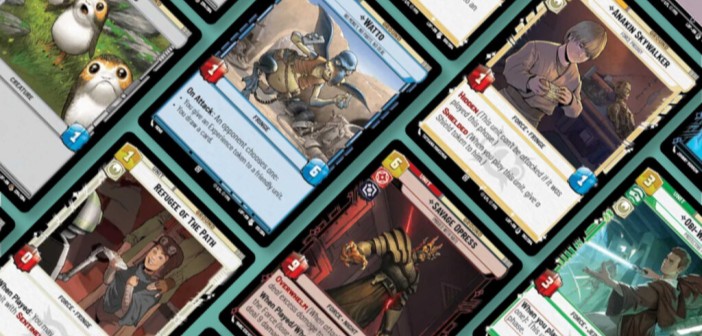ManSpace magazine was lucky enough to get a review copy of the latest Star Wars: Unlimited Set, the fifth set in the card game’s short life: Legends of the Force.
I’ll be honest with you right out of the gate: I’m not a seasoned tabletop card gamer. My experience with the format starts, like most, with Magic: The Gathering (MTG). I’ve been playing MTG quite heavily for about a year, and while I’ve spent enough time learning about mana curves and card synergies to sound vaguely knowledgeable in front of strangers at the local card shop, I’m still very much a rookie.
What I do have under my belt, however, are thousands of hours playing Hearthstone, more seasons than I care to admit climbing the Marvel Snap ladder, a fair bit of dabbling in Legends of Runeterra and the incredibly underrated yet underfunded Pokémon Trading Card Game Online (that’s the one before the super successful new one).
Digital card games have been my playground, and when a box of cardboard Star Wars cards landed on my desk, I wasn’t sure if I’d love them or get absolutely smoked by the learning curve.
While I may not be a Jedi Master when it comes to card gaming, I did pack a Master Yoda card in my boosters, which feels like the game itself was giving me a respectful nod and saying, “The Force is strong with this one.”
First impressions
The first thing that struck me about Star Wars: Unlimited is how accessible it feels compared to the other big, intimidating names in the genre. MTG is like learning a new language. You think you understand the basics, then someone pulls out a stack of cards with rules text longer than a uni essay, and suddenly you’re Googling the most obscure text interactions (“Erm, JUDGE!”).
In contrast, Star Wars: Unlimited makes its mechanics feel leaner, sharper and easier to parse for newcomers. It doesn’t hurt that everything is wrapped in the galaxy far, far away. The art is crisp, vibrant and filled with fan service.
Pulling a card featuring Darth Vader or Boba Fett doesn’t just feel like a play opportunity; it feels like you’re holding a tiny piece of Star Wars history. Even if you’ve never played a card game in your life, there’s a thrill to peeling back a foil wrapper and seeing who (or what) emerges.
The starter decks
I’m familiar enough with card games to know that the starter decks are by no means competitive decks, but by golly, it feels good to start a new card franchise as a wide-eyed noob using the starter deck.
I got the Qui-Gon Jinn starter deck (“spotlight deck” is the correct terminology) and it was heaps of fun. My friend bought the Darth Maul starter deck, and away we went. It’s exactly what it sounds like: A ready-to-play introduction that lets you hit the ground running.
I didn’t muck about with trying to integrate some new cards from the boosters from the get-go. I like to tackle new games the way the designers want me to, with the starter decks.
How it plays
Here’s where I’ll risk upsetting the purists: Star Wars: Unlimited feels like a happy middle ground between the heavy, heady complexity of MTG and the fast-paced snappiness of games like Marvel Snap.
Turns are structured but quick, with enough strategy to keep you thinking but not so many branching paths that you lock up in analysis paralysis.
Compared to a game like Yu-Gi-Oh or Hearthstone, which often devolves into who can draw their combo pieces first (especially the former *rolls eyes*), Star Wars: Unlimited feels more tactical.
Positioning, timing and card synergies matter, but you don’t need to memorise a spreadsheet of deck archetypes to have fun. It’s easy to learn the flow of play while still rewarding those who want to dig deeper.
Should you play it?
If you’re a diehard Star Wars fan, the answer is already yes. Obviously, the Venn Diagram of TCG fans and Star Wars fans is almost a pure circle (I’m in there), and I’m always impressed by how game designers fit the character’s (or ship’s) personality into the flavour of the card.
If you’re looking for MTG’s complexity with your favourite characters, stick to the Secret Lairs (if you have a small fortune to spend), but that’s also an unfair comparison because Wizards of the Coast has had decades to build the game.
What I like about Star Wars: Unlimited is the ceiling of the gameplay. You’re not looking at it, concerned about it getting stale or power creep. Yes, power creep is inevitable in any card game, but there aren’t any glaring worries in my eyes.
In short, the rules are digestible, the art is fantastic, and the starter deck gives you a low-stakes way to dip your toes in. I’m looking forward to buying more decks, packs, and really getting into the finer details of the game.





